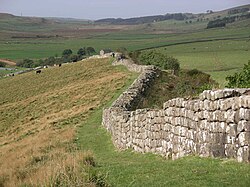History

Antecedents
While the phrase is modern in origin, Roman Emperor Hadrian (AD 76–138) applied the same principles. [3] His policy was described in the 4th century AD Historia Augusta as "more desirous of peace than of war, he trained the army as if war were imminent." [3] Hadrian's Wall was a symbol and manifestation of this policy. [4] For these reasons modern writers have associated the concept of peace through strength with Hadrian, though he never used that exact phrase. [3] [5] [6] In the 4th century AD, the Latin phrase Igitur qui desiderat pacem, praeparet bellum ("Therefore, whoever desires peace, let him prepare for war") was written by Vegetius in his De Re Militari ; it is sometimes misquoted as Si vis pacem, para bellum ("If you want peace, prepare for war"). [2]
The first US president, George Washington, enunciated a policy of keeping the peace through military preparedness, in his fifth annual message to Congress, the 1793 State of the Union Address. He said "if we desire to secure peace, one of the most powerful instruments of our rising prosperity, it must be known that we are at all times ready for war." [7] [8]
United Kingdom

"Peace through strength" was first used in the context of foreign policy in the United Kingdom in 1936, as a public relations campaign to promote the idea of mutual defense between Britain's colonies against the Axis powers – initially under the slogan "Peace through strength and unity in our empire." [10] [11] [12] [13] The campaign was launched by supporters of soon to be Prime Minister Neville Chamberlain on the birthday of his father, Joseph Chamberlain. [10] Chamberlain expanded the policy underpinning the slogan to include recent allies Poland, Romania, and Greece. [14] In February 1939, justifying a massive rearmament program, Chamberlain said British policy was "a policy of peace through strength". [9] Chamberlain's foreign policies, as some historians argue, ultimately failed to prevent World War II. [15] [16] Nearly ninety years later, in 2025, UK prime minister Keir Starmer said the country is moving to "warfighting readiness" in order to show potential adversaries that the country is "ready to deliver peace through strength." [17] [18]
United States

By late 1939, with the outbreak of WWII, some in the United States adopted the British slogan 'Peace through Strength' - Britain was no longer at peace, but the United States was, and peace through strength was a rallying cry for some isolationists who wanted to keep the US out of WWII. [19] [20]

Following the war and with the rise of Cold War tensions, the phrase began having more currency in the USA. President Harry S. Truman said on April 4, 1951, that NATO represented a "force whose object is to maintain peace through strength." [22] In 1952 there was published Peace Through Strength, a biography of Bernard Baruch, a World War II adviser to US President Franklin D. Roosevelt. [5] [23] Up until the early 1960s, it was used by military leaders, academics and both Republicans and Democrats. Pentagon strategist, Fritz G. A. Kraemer (1908-2003) was a prominent advocate of the "peace through strength" doctrine. For decades, he promoted this approach, arguing that a strong and credible military posture was essential to deter aggression and maintain peace. [24]
During Barry Goldwater's 1964 presidential campaign, the Republican Party spent about $5 million on TV ads promoting Goldwater's foreign policy position of "Peace through Strength," making the phrase more broadly known to the public and associated with the Republican Party platform. [25] President Richard Nixon sought to end the Vietnam War, a goal he called "Peace with Honor", by using the strategy of Peace Through Strength, which included the application of military strength (eg. Operation Linebacker II), and diplomatic strength through the isolation of Vietnam from its allies China and Russia. [26] After the war, President Gerald Ford was a bridge from Nixon's attempt to achieve Peace with Honor during wartime, to maintaining Peace Through Strength, a policy which Ford adopted in his 1977 State of the Union Address. [27] [28] In 1980, Ronald Reagan, who had campaigned for Goldwater in 1964, used the phrase during his election challenge against Jimmy Carter by accusing the incumbent of weak, vacillating leadership that invited enemies to attack the United States and its allies. [29] [30] Reagan later considered it one of the mainstays of his foreign policy as president. [31] [32] "Peace Through Strength" has continued to appear in every Republican Party platform since 1980. [33] "Peace Through Strength" is the official motto of the Nimitz-class nuclear-powered aircraft carrier, USS Ronald Reagan (CVN-76). [34] President Donald Trump was a significant proponent of Peace Through Strength policy during both terms. [21]
Other nations
In March 2025, French president Macron said, "This is the moment when our strategy of peace through strength comes into play," referring to an arms build-up in Europe, sanctions, and possible peace-keeping troops in Ukraine. [35] He later said, "the approach of peace through strength [in Ukraine] is the one we're continuing to take." [36]
In Taiwan, "peace through strength" is a slogan of Taiwanese nationalism, meaning to emphasize Taiwan's sovereignty, strengthen its military power, and work with the United States and Japan to guard against possible aggression by the People's Republic of China. Lai Ching-te, the eighth president of the Republic of China (Taiwan), emphasized "peace through strength" even before he became president. [37] On 19 June 2024, president Lai reiterated that "peace must rely on strength, which is to say avoiding war by preparing for war to achieve peace". [38]
